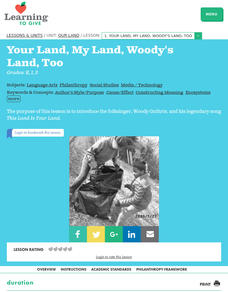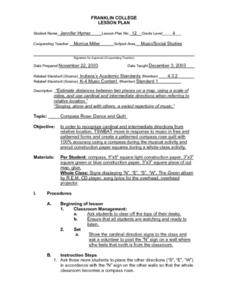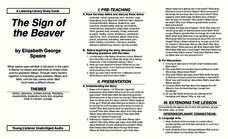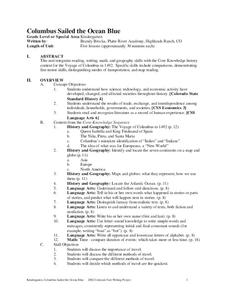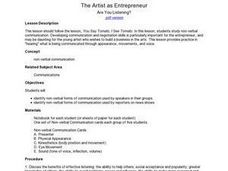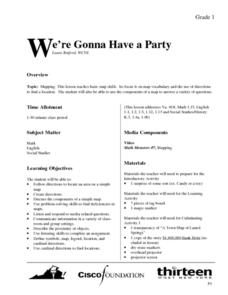Curated OER
The Influence of Jazz Music in Twentieth Century Art
Students examine the effect of music on society. While listening to music, they identify the beat, rhythm and write down their reaction to it. Listening to longer selections, they assign a color to the music and share it with the...
Curated OER
Turn Down Music to Save Hearing
Students participate in a informal survey of their listening habits, then read a news article about the possibility of portable music players harming kids hearing. In this current events activity, the teacher introduces the article with...
Curated OER
Your Land, My Land, Woody's Land, Too
Young scholars are introduced to the folksinger, Woody Guthrie, and his legendary song This Land Is Your Land. After listening to the song, students engage in a discussion which emphasizes that Woody Guthrie wrote songs for everyone;...
Curated OER
Bedrich Smetana
Students discuss the Genesee River and they describe the different things they might see on its shore. They are asked to name different activities people do around the river. Students related the Genesee to the Moldau, they are told a...
Visa
Making it Work Together: Money and Roommates
Balancing money and first-time roommates can feel like a daunting prospect. Support your class members in understanding how financial agreements between roommates function, as well as the underlying importance of how to communicate about...
Fluence Learning
Writing About Informational Text: Music and the Brain
Even if you've never picked up a musical instrument, chances are that music has directly impacted your mental and emotional development. Sixth graders engage in a reading activity in which they read two articles on the impact of music on...
K20 LEARN
Move, Flip, and Slide! Building Relationships and Community In the Classroom
Here's a fresh take on those first days of school introductions. Learners use Flipgrid to create a video that introduces themselves to their classmates. The richly detailed and carefully scaffolded lesson provides specific directions for...
Curated OER
Listening for Leschi: Voices from the Past
Learners interview a family other than their own to learn about oral history. In this oral history lesson plan, students also create a newspaper article about Leschi and pretend they interviewed him back in the past.
Curated OER
Compass Rose: Dance and Quilt
Fourth graders identify the cardinal directions by listening to a song entitled, "Stand," and by reviewing the lyrics to that song. They notice the cardinal directions that are posted around the classroom. They perform the motions as...
Listening Library
The Sign of the Beaver
Extend a class reading of the novel The Sign of the Beaver across all subject areas with this literature unit guide. From basic discussion questions and writing prompts, to a research project about tracking animals, this resource offers...
Core Knowledge Foundation
Columbus Sailed the Ocean Blue
Young adventurers embark on a journey, setting sail along the blue ocean with Christopher Columbus. Teachers will find that this unit makes their lesson planning smooth sailing!
Curated OER
The Artist as Entrepreneur: Are You Listening?
Students study non-verbal communication through appearance, movements and voice. They evaluate the non-verbal communication of television reporters and then participate in role-play scenarios using non-verbal communication.
Curated OER
We're Gonna Have A Party
First graders explore map skills. They discuss the map vocabulary and use directions to find a location on a map. Students discuss and use the components of a map to answer a variety of questions. They use the map and directions to find...
Curated OER
Verdi
Third graders explore language arts by answering study questions about a book they read. In this reading summary instructional activity, 3rd graders read the book Verdi by Janell Cannon and identify the plot, characters and sequence of...
Curated OER
From Claws to Jaws: Atlantic Regions of the United States
Students explore New England, Mid-Atlantic, and southeastern regions of the United States. In this social studies thematic unit, students research a state and make a regional quilt. Students wrte a book report and read two novels whose...
Curated OER
Social Life in the 1950's and Domestic Politics and Policy
Eleventh graders examine the cultural mood and politics of the 1950's in the United States. They read a section of their text and take notes, view a clip of the movie "Pleasantville" and discuss societal roles in the 1950's, and listen...
Curated OER
Stop, Look, and Listen
Second graders participate in a class discussion and view a traffic safety video dealing with crossing the street safely. They discuss the steps taken in order to cross the street safely and then analyze the benefits of walking and...
Curated OER
Let's Review for Better Achievement
Seventh graders create goals using two or more skills they have identified to help them improve academic achievement. They discuss the question: What choices do you make that affect your grades? Students listen to the story of Sam the...
Curated OER
Communication and Social Networks
Pupils work in cooperative groups to explore communication needs of our world. They are assigned a demographic area and asked to create ways to solve communication problems with innovative ideas. They also explore areas that can help...
Community High School of Vermont
Habits of the Mind
An informative one-page resource details the 16 Habits of Mind. Habits encourage positive problem-solving, self-awareness, creativity, and dedication—lifelong skills that can be used in both academic and social settings.
John F. Kennedy Presidential Library & Museum
Ask Not What Your Country Can Do for You
Ask not what the lesson here can do for you, but what you can do with the lesson. The answer is quite a lot! Young scholars revisit JFK's famous inaugural address with a focus on his plea for civic engagement. There's a letter to JFK...
PBS
Racial Equality: How Far Have We Come and How Far Do We Have To Go?
Is everyone treated fairly in America? The culminating fifth lesson from a series of five has pupils explore racial inequalities from the 1960s and decide whether or not society has changed over time. The lesson comes with a speech from...
Humanities Texas
Primary Source Worksheet: Franklin D. Roosevelt, First Inaugural Address
Young historians will learn not to fear primary source materials (or fear itself, for that matter) thanks to this resource that uses Franklin D. Roosevelt's March 4, 1933 Inaugural Address to model how to conduct a close reading of such...
Facing History and Ourselves
Confirmation and Other Biases
As the investigation into the reporting of the events in Ferguson, Missouri, continues, class members consider how bias influences perception, how the tendency is to collect evidence that supports preconceived notions. The big idea...




